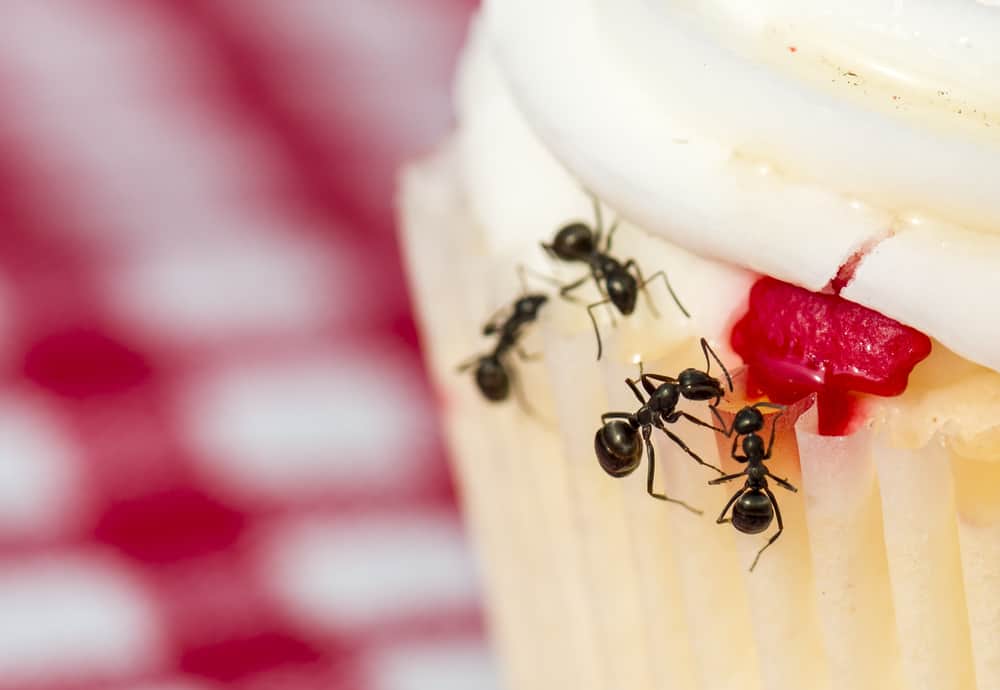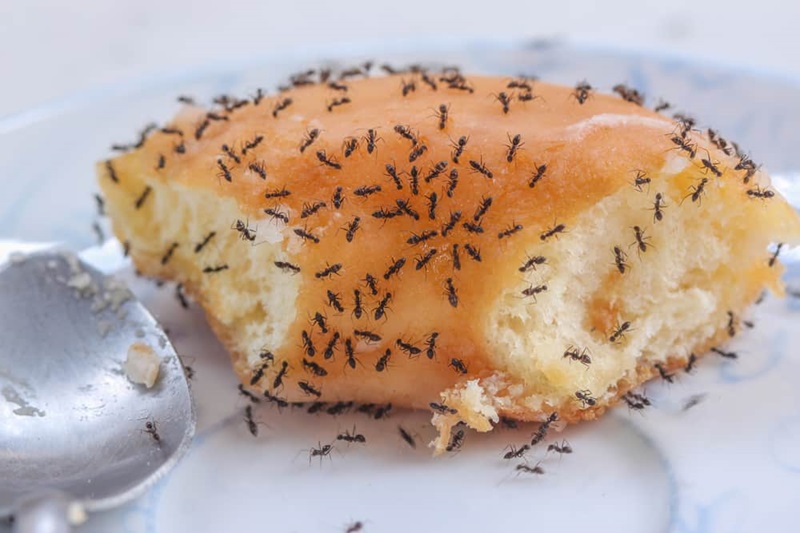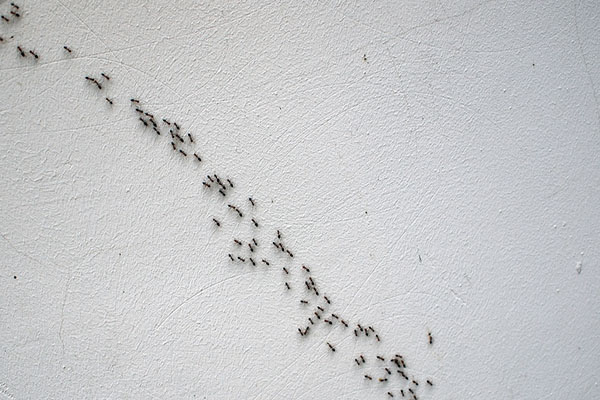Ants are social insects, so when one ant enters your home, others may follow. Discover a few tips to help get rid of ants and make sure they stay out of your house permanently

Contributed by: Pat Hottel
Last modified: August 16, 2022
In this article, we'll walk you through some of the most commonly asked questions about ants in your home, including:
- Why do you have an ant problem?
- What to do if you find ants in your house
- Do you need to know what type of ants you have in order to get rid of them?
- What is the best way to get rid of ants?
- Conventional methods to get rid of ants in the house
- Do over-the-counter ant sprays work?
- How long does it take to get rid of ants?
- Why do some colonies still survive after treatment?
- Can you ever fully get rid of ants?
- How do I keep ants out of my house?
Why do you have an ant problem?
Ants can enter your home for any number of reasons, although they are most likely searching for food. For ants, your home is like the perfect picnic, in that it happens to have many of the foods they prefer to eat, and it is conveniently located in their foraging areas.
Ants must eat in order to survive. Ant workers need food for energy and to feed the queen and young of the colony. They aren't in your home to intentionally cause distress. They are simply trying to survive just like any other animal or plant on Earth.
Ants invade your home because it represents a possible food and water source. It can also provide protection from predators and the elements, thus serving as a potential site for new colonies when they're ready to expand. Obviously, you'll want to prevent this invasion and colonization from happening whenever you can.
Learn more about what attracts ants.
What to do if you find ants in your house
Getting rid of ants inside your house isn't always a simple fix. Although cleanliness is usually a major factor regarding ant infestations, some infestations can occur simply because your property is a haven for ants. This can create problems for homeowners as the late spring and early summer nuptial flights take place. Large swarms of winged ants set out to start new colonies, sometimes right in the voids of your walls.
Getting rid of ants sometimes simply means getting rid of the insects immediately when you see them. Clean the area where the ants traveled with a regular kitchen disinfectant or cleaning solution. This will erase the scented trails they leave behind. Ants that have never been in your home can follow this trail directly to the food sources previous visitors have found – so erasing these trails can prevent more ants following the initial scouting ants.
Related: How to Get Rid of Ants Naturally
Do you need to know what type of ants you have in order to get rid of them?
Knowing the species of ant you are dealing with is an important step in getting rid of them. If you know your enemy, you will know where to find the nest, what food preferences are attracting them and which management methods will be the best way to get rid of ants.
For example, little black ants generally reside in their colony outdoors. They enter structures in order to scavenge for food such as sugar, starches and meat. A little black ant infestation is best treated by following the ant trail back to the colony and treating the problem at the source. The next step would be sealing off all entry points so any remaining or future ants cannot get into your house.

On the other hand, carpenter ants require a much more dedicated approach. Carpenter ants are very hard to control, especially since they prefer to nest in moist wood and voids. These nests can cause further damage to the wood, and since moist wood is typically found in previously damaged locations (e.g., places with leaks, foundations that were exposed to the elements, etc.), this can potentially be a sign of bigger problems beyond having a few ants walk across your kitchen counter.
Carpenter ant nests are difficult to find since they can nest in a variety of locations both inside and outside your home. A carpenter ant nest indoors is typically tied to a parent colony outdoors. In order to get complete control, both colony sources need to be eliminated. A pest management professional will need to conduct a more thorough investigation before they help you draw up the most effective pest control plan for battling carpenter ants.
Learn more about how to identify different types of ants.
What's the best way to get rid of ants?
The best way to learn how to get rid of ants in the house is prevention. Most species of ants that have invaded your home are simply looking for food. The harder you make it for them to obtain food, the less attractive your home will be to ants. If they aren't finding what they're looking for, ants will look somewhere else (which is good news for you, but might be bad news for your neighbors).
Unfortunately, achieving a spotless home can be difficult. What looks like a clean kitchen at first glance might, upon closer inspection, include a few granules of sugar on the countertop or a couple of crumbs that fell behind the stove. This seemingly insignificant portion of food is a feast fit for a king - or an ant queen – once the worker ants bring it back to their colony.
To avoid leaving behind small bits of food that may attract ants, don't just wipe down surfaces. Take a more proactive approach and vacuum every day, especially if your home is prone to food spills from pets and small children. Pay close attention to the baseboards, behind furniture and appliances as well as other areas you might typically miss. Additionally, ants will get in your trash, so waste management is vital to ant control. Remove garbage that contains food scraps daily.

In addition to wiping down surfaces and vacuuming the floors, proper food storage is important. An ant can easily climb inside an open box of cookies, even if you've rolled the inside bag tightly and used the tabbed closing function on the box top. Once a package is opened, it can be easily accessed by foraging ants. To avoid leaving your food open to ants, purchase airtight containers to store any food that may sit on your countertop or outside the refrigerator.
The lids should lock tightly, providing no means for an ant or any other scavenger to gain entry. Wipe down the outside of storage bins and other containers after every use. Ants can feed on the "invisible" residue you leave behind, such as the outside of a sticky jelly jar or excess film from a spill you thought you had cleaned up. Keep as much food as possible stored in places and containers that are harder to access (e.g., freezers, refrigerators, resealable plastic bags, mason jars, etc.).
Finally, and most importantly, having an ongoing service plan for ants with a pest management professional is essential to managing ant problems in your home. Your service technician will work with you to better understand your specific scenario, identify entry points and other factors to create the best approach for helping to get rid of ants and preventing future infestations. Following an inspection, a comprehensive treatment plan can include interior and exterior treatments, sealing up entry points around the home and placing insect growth regulators around the property.
Conventional methods to get rid of ants in the house
When presented with the problem of ants, many homeowners attempt to take matters into their own hands. However, the DIY approach to getting ants out of your home can often be ineffective and have several critical drawbacks. While many professionals use a combination of baits, traps, and sprays, many of these items can be found in most home improvement stores. However, improper use may not yield the desired results when attempting to get rid of ants in and around your home.
Ant baits
Ant baits are small plastic containers equipped with an insecticide mixed with a food substance (such as sugar) and an insecticide. They can be used indoors or outdoors where ants are foraging. Ant baits may be applied in containerized stations or as a gel or granule into cracks and crevices. Once lured in by the substance inside an ant bait, these ants then carry it back to their colony, killing its members. Ant baits are most effective when placed in areas where ants typically travel, such as near baseboards and outside doors.
For maximum efficacy and safety, be sure to properly place ant baits. Although ant baits are relatively low in toxicity to people and pets, care is required in placing them in areas inaccessible to children and pets. Always follow the instructions on the associated product label.
Pros: Easy to use, inexpensive, affects the entire ant colony
Cons: May take days to work, may pose a risk to kids and pets
Ant traps
Ant "traps," like ant bait, usually contain a food source that draws ants into the trap where they get stuck and die. Some ant traps do contain bait, but also have a sticky glue that prevents ants from leaving and carrying it back to their colony. You will need to empty the traps to get rid of the dead ants or dispose of used ant traps altogether.
Pros: Easy to use, inexpensive, kills foraging ants right away
Cons: Only kills a small percentage of the colony, which will likely not get rid of the ant infestation
Ant spray
Ant sprays (insecticidal sprays) kill ants on contact. A few types of ant sprays also have a residual effect, killing ants that travel through the sprayed area later. It is important to read and follow all instructions printed on the label of the product before use. However, these commercially available aerosol sprays don't just come in contact with ants. Be careful when applying aerosols, since the insecticide may drift from the targeted site. Do not contaminate food, food contact surfaces or other sensitive items with the material.
Pros: Fast acting, Can be used for direct treatment of the nest when the nest is found for effective control
Cons: Care must be taken when applying around kids and pets, may only impact and reduce workers and not provide total colony elimination
Do over-the-counter ant sprays work?
Some over-the-counter ant sprays may work initially, but only when sprayed directly on ants. Unfortunately, they usually won't solve an ant infestation. Other sprays have a residual effect, meaning they can be effective means of getting rid of ants even if not sprayed directly on the insects.
It's important to explicitly follow all directions printed on the product label. Additionally, please keep in mind that over-the-counter ant sprays can be harmful if not used with care per the label instructions. Some sprays are meant to kill the ants you see and act as a deterrent. Most over-the-counter products have no residual (or lasting) effect. If ants are still able to enter your home, they will simply find a way around the spray. Plus, their colony will still be intact, producing more and more ants in search of food and shelter – potentially, inside your home. Because of the wide array of products available on the market, contacting a professional pest management company is your best bet for getting rid of ants in the house.
Additionally, some colonies are nearly impossible to reach without special equipment. If a colony or nest is located within your walls, a simple spray that anyone can buy at a home improvement store will not be sufficient to properly treat the colony hiding within your walls. Similarly, outdoor colonies can extend far beyond your home.
Looking for a natural way? Learn more about how to get rid of ants naturally inside.
How long does it take to get rid of ants?
Completely getting rid of ants is a process. It takes time and perseverance. If you use conventional methods or natural DIY methods, you may be misled and see results right away only to have the ants return a few days later. That's because most DIY methods do not kill the ant colony. Seeking professional help to get rid of ants in your home is the best way to help solve your ant problem.
Professional treatments may require more than one visit to get rid of all the ants. Experienced Terminix® technicians first seek out ant colonies, which may be located in a remote or hard-to-access place on your property. Once identified, they use integrated pest management techniques which are a comprehensive approach to kill the ant colony. You will probably see fewer ants after the first visit, but it can sometimes take between one to two weeks – sometimes longer – to eliminate ants, depending on the size and location of the colony.
Why do some colonies still survive after treatment?
In addition to inadequate delivery of treatment, colonies can continue to thrive for one other simple reason: the queen ant survives. Ant problems don't start in your home, they start in the nest. You might only recognize the problem once the ants have invaded your living space. And while you might think that the more ants you see, the more chance they'll be breeding, this is not the case. The one sole ant in charge of populating the entire colony is the queen. As long as she is unharmed, she can produce more ants to enter your home. The more she makes, the more they need to eat.
Complicating the matter is that the queen ant never leaves the nest after she has established her colony, so there's no chance you'll get to her when you kill those ants in your kitchen. She creates worker ants to feed the young inside the nest, which she is continually populating. The worker ants are the ones you see in your house. So, even if you learn how to get rid of ants in the kitchen, they'll soon be replaced with new workers by the queen. The only way to get rid of an ant colony that's causing problems in your home is to get rid of the queen.
Can you ever fully get rid of ants?
While it's nice to imagine a world without pests, the truth is there are more of them than there are of us. The fight against ants and other bugs or insects is ongoing. Some of the problems with getting rid of ants rest within the ant's capabilities. The only true solution for ant infestations are treatments delivered by pest management professionals, followed by a strict adherence and dedication to prevention. Ants are part of the natural landscape and the potential for reinfestation is not going to be totally eliminated. In other words: ants will always come back. It's just a matter of how difficult you make it for them to enter your home, and how prepared you are for them once they get there.
How do I keep ants out of my house?
You can help prevent ants from coming into your house by taking an active role in eliminating sources of food and standing water that attracts these pests and allows them to thrive. Clean your kitchen often, and inspect areas that are more likely to attract ants, such as drains, potted plants, garbage cans, food pantries, and pet eating areas.
Follow these guidelines to make your home less inviting to ants:
- Keep your kitchen clean of food spills and crumbs.
- Store food on the counter in airtight containers.
- Clean your toaster often, discarding crumbs.
- Inspect cupboards, pantries and the cabinets under your sinks and in your bathrooms for spills or water leaks.
- Keep garbage cans closed tightly with a lid. Clean them inside and out with a disinfectant.
- Outdoor trash bins should be kept at least 10 feet from your home.
- Keep pet bowls clean and wipe up water spills right away.
- Inspect potted plants, looking for insect activity.
Even if you follow all these steps, there is still the possibility that ants will enter your home and find something to eat and drink. That's when it's time to call in the professionals.
Need help getting rid of ants in your home fast?
Terminix specialists can make sure the ants in your house know their lease is up. Schedule a free appointment with our professionally trained technicians today.